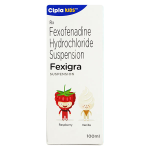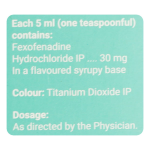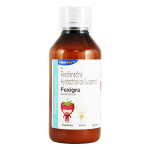FEXIGRA Raspberry Vanilla Suspension 100ml
INTRODUCTION ABOUT FEXIGRA SUSPENSION
FEXIGRA SUSPENSION contains Fexofenadine which belongs to the group of medicine called Antihistamines. It is used to provide relief from symptoms associated with seasonal allergic rhinitis in children (aged 2 to 11 years). It is also used to manage uncomplicated skin manifestations of chronic idiopathic urticaria in children (aged 6 months to 11 years of age).
Seasonal allergic rhinitis is an inflammatory condition of the upper airways that occurs in response to exposure to airborne allergens (such as tree, grass, and weed pollens) in sensitized individuals, generally characterized by symptoms such as nasal stuffiness, itchy nose/throat/eyes, headache, and weakness. Chronic idiopathic urticaria is a disturbing allergic condition of the skin that recurs without any known cause which is generally characterized by symptoms such as raised/swollen wheals on skin, itching, and swelling of the lips, eyelids, or throat.
Avoid giving fruit juices (such as grapefruit, orange and apple juice) to your child while taking FEXIGRA SUSPENSION since it may reduce the effect of this medicine. Before administering FEXIGRA SUSPENSION, inform child’s doctor if your child has liver, kidney, or heart problems. FEXIGRA SUSPENSION is not recommended for use in children who are allergic to fexofenadine.
It is not indicated for use in pregnant and breastfeeding women since it is recommended for use only in children. The most common side effects of taking FEXIGRA SUSPENSION are headache, back pain, dizziness, stomach discomfort, pain in extremity, fever, middle ear infection, and vomiting. Contact child’s physician if any of the symptoms worsen.
USES OF FEXIGRA SUSPENSION
- Relives symptoms associated with seasonal allergic rhinitis in children (aged 2 to 11 years)
- Manage uncomplicated skin manifestations of chronic idiopathic urticaria in children (aged 6 months to 11 years)
HOW FEXIGRA SUSPENSION WORKS
FEXIGRA SUSPENSION works by blocking the actions of H1 histamine receptors (chemical substance responsible for allergic reactions) that results in managing the occurrence of seasonal allergic rhinitis and idiopathic urticaria thus providing relief from the symptoms associated with both conditions.
DIRECTIONS FOR USE
Give FEXIGRA SUSPENSION to your child as advised by the physician. Shake well before each use. Your doctor will decide the correct dose and duration for your child depending upon age, body weight and severity of the condition.
SIDE EFFECTS OF FEXIGRA SUSPENSION
COMMON
- headache
- back pain
- dizziness
- stomach discomfort
- pain in extremity
- fever
- middle ear infection
- vomiting
- diarrhoea
- excess sleepiness
- weakness
- accidental injury
- indigestion
- muscle pain
- nausea
UNCOMMON
- tiredness
RARE
- nervousness
- sleep disorders
- paroniria (nightmares)
- signs of hypersensitivity reaction (immunologic reaction to allergen) such as sneezing, itchy, red eyes, wheezing
Stop giving FEXIGRA SUSPENSION to your child and contact doctor immediately if your child experiences any of the following side effects:
- signs of serious allergic reactions such as swelling of the face, lips, tongue or throat and difficulty breathing
HOW TO MANAGE SIDE EFFECTS
Diarrhea
Advise your child to drink plenty of water and stay hydrated. Try to avoid giving any medicine on your own to your child to manage diarrhea. Consult child’s doctor if the symptom gets worse.
Headache
Apply hot or cold-water bag on your child’s head. Advise your child to take rest in a quiet room. Massage child’s scalp or head with mild pressure for relieving effect. Consult child’s doctor if the symptom does not improve.
Indigestion
Advise your child to have smaller and more frequent meals and drink slowly. Avoid giving foods that are oily, fried or spicy foods. Consult child’s doctor if the symptom does not improve.
Nausea And Vomiting
Try to give FEXIGRA SUSPENSION to your child with or just after a meal or a snack. Follow simple meal plan for your child. Avoid giving foods that are oily, fried or spicy foods. Consult child’s doctor if the symptom does not improve.
WARNING & PRECAUTIONS
PREGNANCY
ContraindicatedFEXIGRA SUSPENSION is not recommended for use in pregnant women since this dosage is used only in children and adolescents (aged 6 months to 11 years).
BREASTFEEDING
ContraindicatedFEXIGRA SUSPENSION is not recommended for use in breastfeeding women since this dosage is used only in children and adolescents (aged 6 months to 11 years).
DRIVING AND USING MACHINES
Use with CautionFEXIGRA SUSPENSION is not known to cause any impact while performing activities that requires mental concentration. Consult child’s doctor for advice
KIDNEY
Use with CautionFEXIGRA SUSPENSION should be used with caution in children having kidney problems such as decreased kidney function. Consult child’s doctor before giving FEXIGRA SUSPENSION to your child.
LIVER
Use with CautionFEXIGRA SUSPENSION should be used with caution in children with liver problems such as liver impairment. Consult child’s doctor before giving FEXIGRA SUSPENSION to your child
ALLERGY
ContraindicatedDo not give FEXIGRA SUSPENSION to your child if they are allergic to Fexofenadine, or any other ingredients of this medicine.
HEART DISEASE
Use with CautionFEXIGRA SUSPENSION should be used with caution in children having heart disease. Consult child’s doctor before giving FEXIGRA SUSPENSION to your child
USE IN PEDIATRICS
SafeFEXIGRA SUSPENSION is recommended for use in children (aged 2 to 11 years) to manage seasonal allergic rhinitis and in children (aged 6 months to 11 years of age) to manage uncomplicated skin manifestations of chronic idiopathic urticaria. Consult child’s doctor before giving FEXIGRA SUSPENSION to your child.
INTERACTIONS
A. Drug-Drug interactions:
Before giving FEXIGRA SUSPENSION to your child, inform to child’s doctor if your child is taking any of the following medicines:
- aluminum and magnesium gel (medicines used to relieve symptoms of heart burn or indigestion)
- ketoconazole (medicine used to manage fungal infections)
- erythromycin (medicine used to manage bacterial infections)
- omeprazole (medicine used to manage gastric and duodenal ulcers)
B. Drug–Food interactions:
Avoid giving fruit juices (such as grapefruit, orange and apple juice) to your child while taking FEXIGRA SUSPENSION since it may reduce the effect of this drug.
Overdosage:
If your child accidentally takes too much of FEXIGRA SUSPENSION, consult your doctor immediately or visit the nearby hospital. Signs of overdose includes dizziness, drowsiness, fatigue, and dry mouth.
SYNOPSIS
| Drug | : | Fexofenadine |
| Pharmacological Category | : | Antihistamines |
| Therapeutic Indication | : | Seasonal allergic rhinitis, Chronic idiopathic urticaria |
| Dosage Forms | : | Oral dispersible tablet, Tablet, Oral suspension, Syrup |
MORE INFORMATION
- Keep FEXIGRA SUSPENSION out of reach of children
- Store at room temperature
FAQs ABOUT FEXIGRA SUSPENSION
Q: What is FEXIGRA SUSPENSION and why is it given?
A: FEXIGRA SUSPENSION contains fexofenadine, which is an antihistamine agent, used in children to provide relief from symptoms associated with seasonal allergic rhinitis in children (aged 2 to 11 years) which is also used to manage uncomplicated skin manifestations of chronic idiopathic urticaria in affected children (aged 6 months to 11 years).
Q: What common side effects are seen with FEXIGRA SUSPENSION?
A: The most common side effects of taking FEXIGRA SUSPENSION are headache, back pain, dizziness, stomach discomfort, pain in extremity, fever, middle ear infection, and vomiting. Contact child’s physician if the symptoms worsen over the period of time.
Q: Does FEXIGRA SUSPENSION causes headache?
A: Yes, FEXIGRA SUSPENSION can cause headache in your child. To manage this effect, apply hot or cold-water bag on your child’s head. Advise your child to take rest in a quiet room. Massage child’s scalp or head with mild pressure for relieving effect. Consult child’s doctor if the symptom does not improve.
Q: Can FEXIGRA SUSPENSION be used in children with kidney problems?
A: FEXIGRA SUSPENSION should be used with caution in children having kidney problems such as decreased kidney function. Doctor may adjust the dose depending upon kidney function. Consult child’s doctor before giving FEXIGRA SUSPENSION to your child.
Q: What precautions should I follow while giving FEXIGRA SUSPENSION to my child?
A: Avoid giving fruit juices (such as grapefruit, orange and apple juice) to your child while taking FEXIGRA SUSPENSION since it may reduce the effect of this medicine. Inform child’s doctor about previous allergy, medical and medication history to avoid unusual interactions or problems in your child.
REFERENCES
1. KD. Tripathi. Histamine and Antihistaminics. Essentials of medical pharmacology. Eighth edition. 2019. Page – 166.
2. Kari L. Craun, Mark P. Schury. Fexofenadine. NIH National Library of Medicine. National center for biotechnology information. May 2022. [Accessed on 9th June 2022] https://www.ncbi.nlm.nih.gov/books/NBK556104/
3. Sanofi. Safety, Efficacy and Pharmacokinetic Study of Allegra in Pediatric Patients with Perennial Allergic Rhinitis (PAR). NIH U.S. National Library of Medicine ClinicalTrials.gov. [Revised in 2013] [Accessed on 9th June 2022] https://clinicaltrials.gov/ct2/show/NCT01244217
4. Sanofi-Aventis U.S. LLC. U.S. Food & Drug Administration (FDA). [Revised in July 2007] [Accessed on 9th June 2022] https://www.accessdata.fda.gov/drugsatfda_docs/label/2008/020872s018,021963s002lbl.pdf
5. Ciplamed Ltd. Fexigra Oral Suspension (Fexofenadine hydrochloride). Ciplamed [Revised in January 2020]. [Accessed on 9th June 2022] https://www.ciplamed.com/content/fexigra-oral-suspension
USEFUL DIAGNOSTIC TESTS
- Complete blood count
AUTHOR DETAILS
The contents of this website are for informational purposes only and not intended to be a substitute for professional medical advice, diagnosis, or treatment. Please seek the advice of a physician or other qualified health provider with any questions you may have regarding a medical condition. Do not disregard professional medical advice or delay in seeking it because of something you have read on this website.










